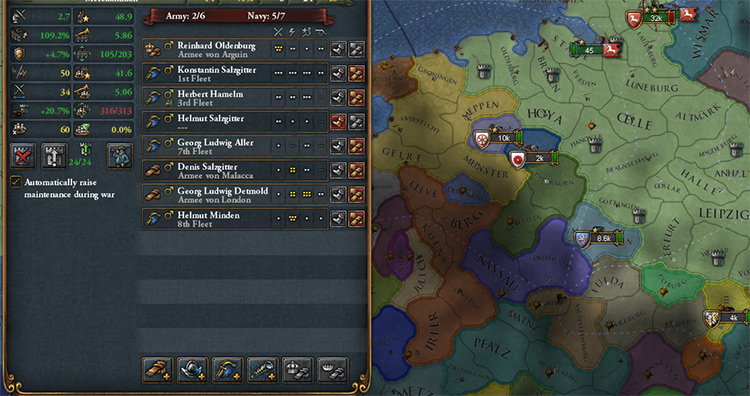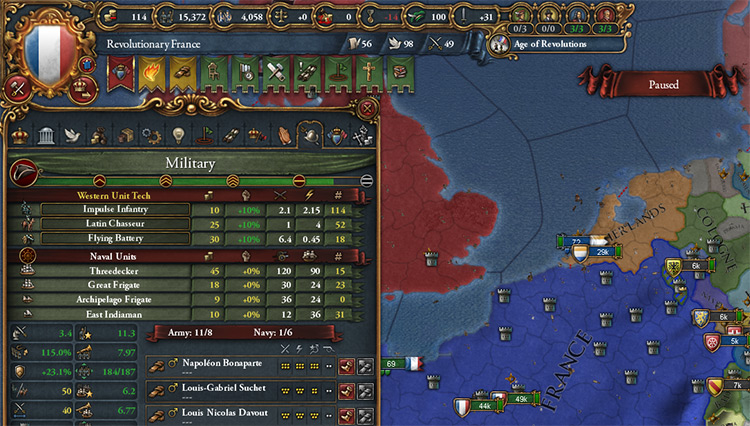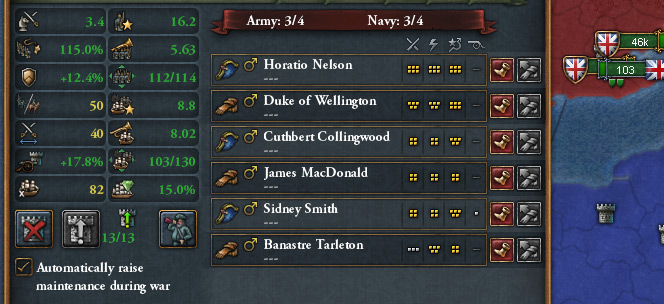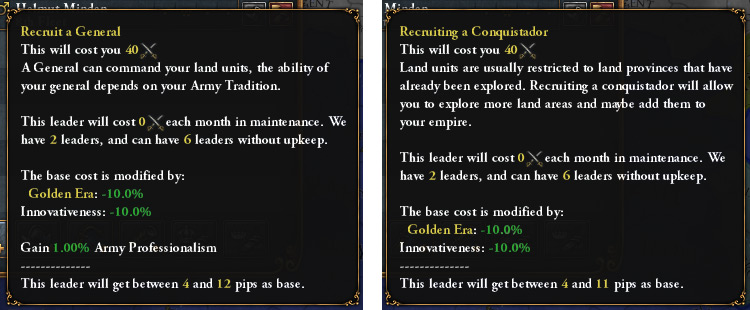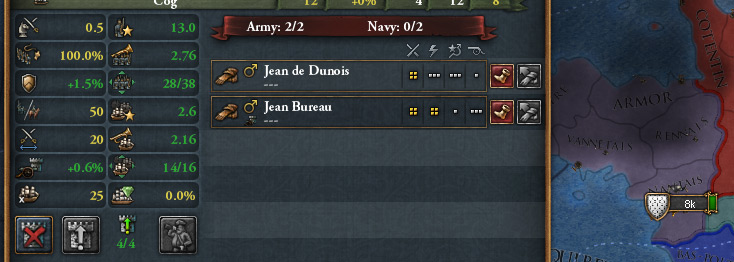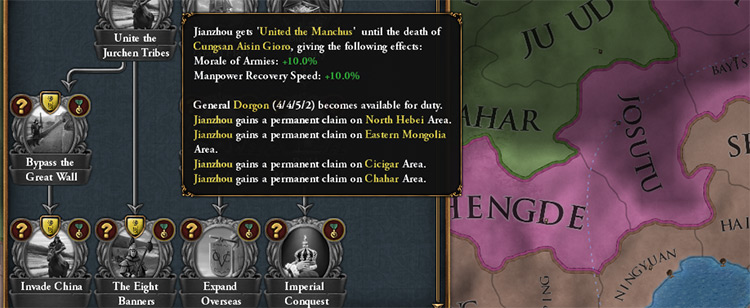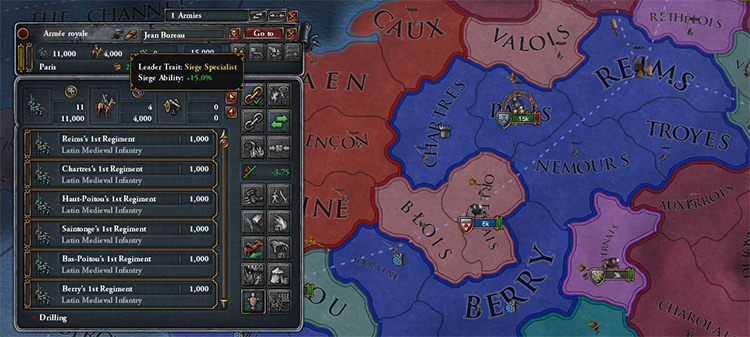It’s imperative you secure some strong generals to complement your military forces. The only way to achieve that is amassing high military tradition and getting leader attribute modifiers from idea groups. Aside from that, some nations enjoy boosts to their generals’ attributes due to their unique national ideas or missions and events. Another way is through random events as well as some nations’ unique mission trees. Granada, for example, can get a 100 army tradition general from a mission if they scornfully insult Castille.
Leader Stats
There are various types of leaders:
Land Leaders Generals (Kings, Consorts and Heirs can also serve as Generals) Conquistadors (Enabled by picking exploration ideas or certain national ideas) Naval Leaders Admirals Explorers (Enabled by picking exploration ideas or certain national ideas and missions)
These leaders possess 4 stats, each of which can have several “pips” ranging from 0 to 6. The ideal leader would have 6 in all 4 stats being a 6/6/6/6 leader. This is very unlikely to occur. The 4 stats are:
- Fire – The leader’s fire pips are added to the dice roll in the fire phase.
- Shock – The leader’s shock pips are added to the dice roll in the shock phase.
- Maneuver – This works differently for land and sea leaders.
Each point of land leader maneuver: Increases movement speed of army by 5%, up to 30%. Reduces unit supply weight by 1, which helps a lot with attrition in low supply provinces. Increases army’s reinforce speed by 10% in unowned territory, but not beyond 100%. Negates river and strait crossing penalties if the attacking leaders has more maneuver pips than the enemy. Each point of naval leader maneuver: Increases engagement width by 10%. Increases fleet trade power by 5%.
- Siege
For land leaders, each siege pip adds +1 to the siege roll. For naval leader, each siege pip adds +10% to the amount of development the fleet can effectively blockade.
What Makes a Leader Good?
Land Leaders
Regarding land leaders, you want to have a lot of shock pips in the early game and more fire pips in the late game. The shock phase is more important early on, while as the game progresses and artillery comes to play, the fire phase becomes what really matters. Maneuver is the least important stat for land warfare. Sure, all the bonuses provided are welcome, but you would rather have these pips in any other attribute. Very useful when trying to catch enemy armies. Aside from those, siege pips are very important throughout the game. Even 1 siege pip can make a huge difference when sieging forts. Generals with low stats on everything but respectable siege pips can be used to speed occupying fort provinces. Fight the battles with other leaders and switch to them for the siege. Siege pips are more rarely distributed, and a 3 or 4 pip siege general is considered excellent.
Naval Leaders
Fire pips are slightly more important than shock pips here, as fire phase always come first. The difference though is negligible unlike in land warfare. Maneuver, completely opposite to land warfare, is the most important stat for a naval leader. When protecting trade, it increases the whole fleet’s trade power significantly. During battles, maneuver massively increases engagement width, up to 60%. This means that if your admiral outclasses the enemy by a lot, you will have far more ships actively fighting. This modifier alone can win battles by itself. Siege pips are unimportant on naval leaders. They can help a bit when blockading high development areas around a single sea-tile. You split your fleets when blockading, so the bonus applies to only the one lead by the admiral.
How To Secure Good leaders
The most important thing to consider when rolling for new leaders is Military Tradition. For more details and ways to acquire military tradition, I strongly suggest checking out my guide on getting military tradition in EU4. The other factor is modifiers boosting leader skills. These can be acquired by:
National Ideas – Many nations have a national idea boosting a particular stat of their leaders by +1. Notable mentions are: Lithuania, land leader maneuver and land leader shock +1 Sultanate of Air, land leader maneuver and land leader shock +1 Netherlands, naval leader fire +2 Shawnee, land leader maneuver +2 Idea Groups Offensive ideas 1, land leader shock +1 Offensive ideas 3, land leader fire +1 Aristocratic ideas, leader siege +1 Policies Expansion-Quality, land leader fire +1 Humanist-Quantity, land leader shock +1 Quantity-Exploration, land leader maneuver +1 Innovative-Offensive, land leader siege +1 Naval-Innovative, naval leader fire +1 Naval-Religious, naval leader shock +1 Innovative-Maritime, naval leader maneuver +1 Maritime-Offensive, naval leader maneuver +1
How is Pip Distribution Determined?
The exact formula for determining new leaders’ pips is quite complicated. Hovering over the “recruit” button will show you the range of potential pips the new leader will have. At 100 military tradition, a new leader will have 7 to 17 total pips, before the +leader skill modifiers are applied. Except in some fringe cases, because of the way leader pips are distributed, exceptional leaders will have at least 2 pips in each stat. A 17-roll leader will first get 2 in each skill for a total of 8, and then the rest of the 9 pips will be distributed. Each pip has exactly a 10% chance to be distributed to the siege stat, and an equal 30% chance to each of the other three stats. This makes it easier to get exceptional naval leaders and harder to get exceptional land leaders. On top of that, any excess pips over 6 are simply lost. This means that even if you initially roll well, the game might distribute all the pips into one category due to bad luck, thus ending up with a mediocre general. This also means that sometimes +X land leader fire/shock/maneuver will go to waste. Siege pips on the other hand will apply on top of the average 3 on exceptional generals, making them almost perfect.
Military Tradition Impact on Leaders
When rolling for a leader, the game uses something called “effective tradition”. This is equal to the following:
Generals, army tradition Conquistadors, 0.8army tradition Rulers/Heirs/Consorts, 0.5army tradition + 7military skill Admirals, navy tradition Explorers, 0.8navy tradition
This means that unless you need them for exploring, conquistadors and explorers are the inferior option when recruiting new leaders. The more tradition you have, the bigger the gap will be. Rulers/Heirs/Consorts can have better prospects when your military tradition is low. At 30 army tradition, a ruler with 6 military skill would roll with 57 effective tradition.
Other Sources of Generals
As mentioned at the start of this guide, you can get your hands on some good generals through events and missions. Some nations also start with very strong generals already employed, like France. Some of the events can be very consistent. Christian monarchies before 1500 can get the “Champion of the Joust” event which gives the option of a 100 military tradition general at the expense of prestige and legitimacy. There are also semi-scripted events related to important people of the era, usually offering choices between making them an advisor, leader or even ruler. They will almost always fire for the involved nation during the relevant period.
Improving Generals
Generals can acquire various traits after participating in a battle. The chance for that happening depends on your army and navy tradition for land and naval leaders respectively. Some of these bonuses are very strong, like +10% infantry combat ability and +10% land fire damage. Sadly, there is no reliable way to get them. Note: Leaders can only ever have a singular trait. But drilling an army gives the assigned leader a chance of getting additional pips. This chance depends on the percentage of the army he is drilling relative to your force limit. It’s roughly 10% per year when a single general is drilling your entire force limit.
Life Expectancy
Generals will not serve you forever. Every military leader that’s employed for at least 5 years has a daily chance of death. This chance increases if they’re assigned to an army. Even more so if that army is engaged in battle. You can reasonably expect a general to serve for 25 years. This is also true for Rulers/Consorts/Heirs. Simply having them as Generals won’t raise their death chances more than normal. When they lead armies and engage in battle though, their chance of death increases significantly. Be extra careful because losing a Ruler or an Heir in battle results in an extra -1 stability hit. If you’re a Monarchy and your ruler is the one dying, that applies on top of the normal -1 for ruler death.
